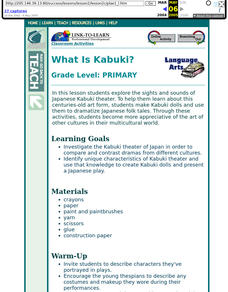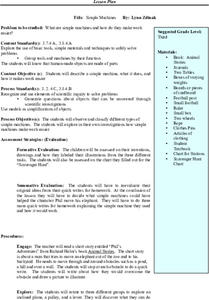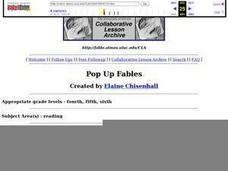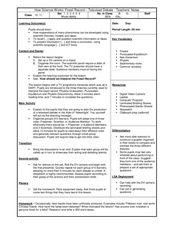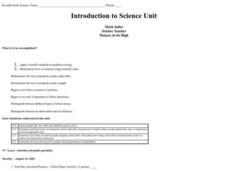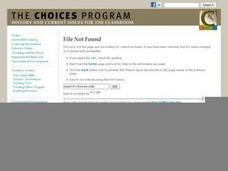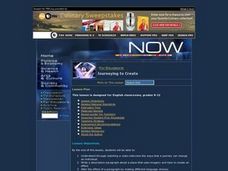Curated OER
Independent - To Be or Not Top Be: Say It Again, Uncle Sam
Fourth graders revise and edit an oral presentation on the American Revolution based on peer feedback. They refine their oral presentation style and pinpoint areas in need of improvement.
Curated OER
Classroom Conservation
Fourth graders suggest ways paper and other natural resources can be used and recycled in the classroom. Students conduct a investigation into paper use and make distinctions among observations, conclusions (inferences), and predictions.
Curated OER
Neanderthals on Trial
Young scholars examine a drawing of a Neanderthal artifact that was found in Solvenia in 1996. They attempt to identify the artifact in small groups, and present their ideas to the whole class. They discover what scientists believe the...
Curated OER
Eating Your Words!
First graders study how to complete activities in sequential steps. They participate in various activities describing each step needed to complete the tasks. They work in pairs to type the list of steps necessary in making a sandwich. ...
Curated OER
The Writings of Robert Boyle
Learners read the introductory text describing the various sources for the history of Boyle's life. They produce a poster illustrating the sources of Boyle's life and writings.
Curated OER
Where Do Green Plants Get Energy?
Fourth graders realize that plants need light, water, and carbon dioxide to carry out photosynthesis. They participate in groups of 4 to plant (with materials provided) a test group of beans to compare to the control group, write a...
Curated OER
Raptor Poster Project
Learners create posters about raptors. They synthesize information they read about raptors and select a raptor. They draw a picture of their raptor and include facts relating to where it lives, characteristics, feeding habits, size, name...
Curated OER
Simple Machines
Third graders listen to a short story entitled, "Phil's Adventures" from a book called Animal Stories. They stop at each obstacle in the story and do a quick write about how they would overcome the obstacle and draw a picture to...
Curated OER
Quoting the Dalai Lama
Students read and reflect on statements made by the Dalai Lama and
discuss with cooperative group members what they believe is
meant by the statement and how to report this information the
rest of the class. They take turns presenting...
Curated OER
Writing a Cooperative Class Story (3+)
Learners write a beginning of a story, or as much as they can in 5 minutes. They pass their papers in a given order, then read the other student story and continue it for another 5 minutes.
Curated OER
Pop Up Fables
Students read a fable and create a pop-up book of the fable. Students add the moral of the story to the back of the book.
Curated OER
Tony's Spelling Troubles
Students are introduced to the given problem and describe in their own words the situation represented in a bar chart and tally chart. They then use a bar chart and tally chart to make sensible predictions.
Curated OER
Same, But Different
Students compare and contrast specific characters in the book, "Old Henry." They discuss similarities and differences between people and define character traits. They assess one's own character traits and have a class discussion about...
Curated OER
How Science Works: Fossil Record - Televised Debate
Learners compare the three theories used tp interpret fossil records. In this earth science lesson, students create a production of a televised debate. They collaborate with group members to generate relevant questions about the topic.
Curated OER
Introduction to Science
Seventh graders investigate scientific methods to solve problems. They demonstrate creating data tables and graphs. They study the role of a scientist and the importance of safety in a science lab. They distinguish between an...
Curated OER
How Does the USA Patriot Act Approach Race?
Students define and discuss the definitions of race and terrorism as a class. Using the Patriot Act, they analyze it and identify how it is a response to terrorism. They discuss how the documents could be viewed as one that supports...
Channel Islands Film
Eminent Domain
After viewing the documentary The Last Roundup, a documentary about the transitioning of Santa Rosa from a privately own island to a National Park, class members debate the takings clause of the Fifth Amendment that permits the...
Curated OER
Scientific Method: How Many Drops of Water Fit on a Coin?
Young investigators conduct an experiment using the scientific method. They see how many drops of water fit on a coin; have them conduct several different trials. This involves making a hypothesis, looking at controls, and introducing...
Channel Islands Film
Magic Isle: Lesson Plan 1
What are the factors that limit growth and expansion? As part of their study of Catalina Island, class members view the West of the West's documentary Magic Isle and research William Wrigley and the Santa Catalina Island Company. After...
Curated OER
Ornithology and Real World Science
Double click that mouse because you just found an amazing lesson! This cross-curricular Ornithology lesson incorporates literature, writing, reading informational text, data collection, scientific inquiry, Internet research, art, and...
Curated OER
Journeying to Create
Show a video clip that descripes how taking a journey can change a person's outlook on life. Learners write a paragraph about a place that uses imagery and tone to create a specfic effect. They evaluate their journal entries as well.
Science 4 Inquiry
Layers of the Earth
We can't dig a hole through the Earth, so how do we know about the layers beneath our feet? Scholars learn about layering through hands-on exploration of common materials. They study the characteristics of each layer and apply their...
Science 4 Inquiry
Carbon and Climate
The carbon cycle is natural and has happened for millions of years, so can humans change it? Young scientists play the role of carbon as they travel through the carbon cycle. They complete two rounds, once before the industrial...
Science 4 Inquiry
Edible Plate Tectonics
Many people think they can't observe plate tectonics, but thanks to GPS, we know that Australia moves at a rate of 2.7 inches per year, North America at 1 inches per year, and the Pacific plate at more than 3 inches per year! Scholars...



